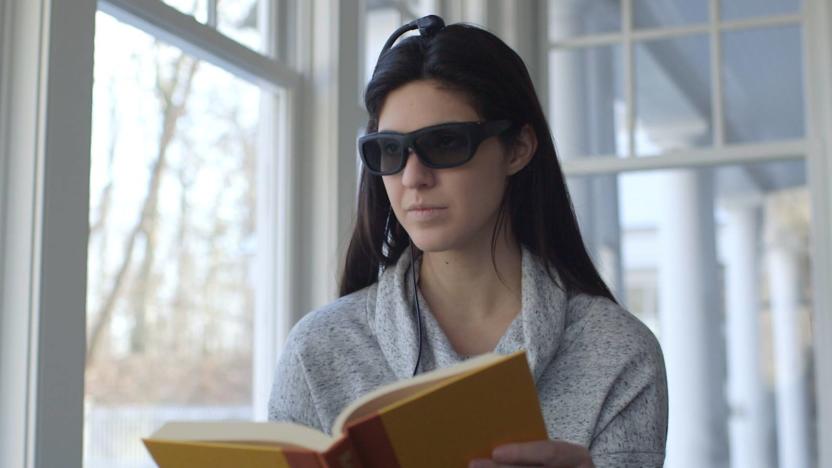concentration
Latest

Narbis smart glasses punish distraction by turning opaque
Operant conditioning is a well known psychology principle -- in which "good" behavior is rewarded and "bad" behavior is punished. While positive reinforcement has found its way into everyday life, formal operant conditioning is usually left to professionals. For better or worse, the tech company Narbis is hoping to change that.

JINS smartglasses swap fitness advice for meditation guidance
In a bid to get you focusing at work, Japan-based JINS has announced a trio of companion apps for its Meme smartglasses. The focus isn't on posture or workouts this time, but literally focus -- by monitoring your eyes. These are the same glasses we've been using at the gym, but this time the apps tap into the high-tech sensors found on the nose bridge. Specifically, three-point electrooculography (EOG) sensors that can pick up minute electromagnetic changes from your eyes, detecting when you blink without any cameras involved. The company cites scientific research that shows that frequency and intensity of our blinks represent whether we're concentrating or not, and JINS has built three different apps that track that. Oh, and your posture, too. No slouching.

IBM solar collector will concentrate the power of 2,000 suns, keep its cool
Modern solar collectors can concentrate only so much energy for safety's sake: too much in one place and they risk cooking themselves. An IBM-led group is working on a new collector dish that could avoid that damage while taking a big step forward in solar power efficiency. The hundreds of photovoltaic chips gathering energy at the center will be cooled by the same sort of microchannel water cooling that kept Aquasar from frying, letting each chip safely concentrate 2,000 times the solar energy it would normally face. The collector also promises to do more with sunlight once it's trapped: since the microchannels should absorb more than half of the waste heat, their hot water byproduct can either be filtered into drinkable water or converted into air conditioning. As you might imagine, IBM sees more than just the obvious environmental benefit. When a receiver will generate about 25kW of energy while costing less to make through cheaper mirrors and structures, a fully developed solar array could be an affordable replacement for coal power that delivers greater independence -- picture remote towns that need a fresh water supply. IBM doesn't estimate when we'll see production of these collectors beyond several prototypes, but the finished work will likely be welcome to anyone frustrated by the scalability of current solar energy.

Focus@Will says its music app boosts concentration, opens it to public beta
So, what were we doing? Oh yeah, blogging -- fortunately, Focus@Will understands our inability to concentrate 100 percent of the time during an eight hour day, and is now going into public beta with a music service app designed to make things better. The company says it helps productivity by perking up your limbic system at specific intervals with "scientifically and artistically curated" music that keeps you from pondering "danger, food, sex or shiny things" instead of working. You can choose from eight music categories like classical, cinematic or "alpha chill," including many new compositions created since the private beta launched in December. The company's also refined its "focus genome" algorithms since then, which help choose tunes based on user feedback in a similar manner to Pandora's Music Genome Project. If you're in the US, you can grab the cross-platform HTML5 app now at the source below, with iOS and Android apps coming soon. Still with us? Good.

Shocker! Excessive cell phone chatter is seriously annoying
It looks like science has confirmed what we were all thinking: being party to one half of someone else's cell phone conversation is seriously annoying. In a paper to be published in an upcoming issue of Psychological Science, Cornell University grad student Lauren Emberson explains it thusly: not being able to hear the responses to one part of the convo proves inherently unsettling, because it's unpredictable, and thus makes it hard to concentrate. According to Science News, Emberson found that, while performing "attention tasks" in silence or while listening to various conversations (including a normal, two-sided conversation, a one-sided cell phone conversation, and a monologue) accurate completion of the tests "declined slightly but to a statistically significant extent" during the one-sided conversations, relative to the other conditions. Now if someone could only do a similar study involving The Best Of Sade, maybe we could cite it the next time we have to ask the barista at the Liberty Avenue Crazy Mocha to turn down the music while we're trying to read.

Isolator: Think Again
We recently mentioned Freeverse's Think, a little utility for helping you concentrate on one task by hiding away all the other windows besides the foreground application. Apparently somebody else liked the basic idea, but didn't quite like Freeverse's somewhat involved execution and so has whipped up a similar but more stream-lined utility called Isolator. Isolator sits in your menubar and, like Think, will isolate the windows of the foreground application by hiding all the others and bringing up a solid color shade over the desktop (though you can adjust the transparency of the shade and even set it so you can sill access the desktop icons). You can also set a hotkey to turn Isolator on and off (F8 by default). I like the idea of a menubar utility of this sort, but if there's anything I don't like about Isolator, it's that when you turn it off the applications it hid are still hidden.Isolator is a free download, but the developer is requesting donations.[Via MacApper]



